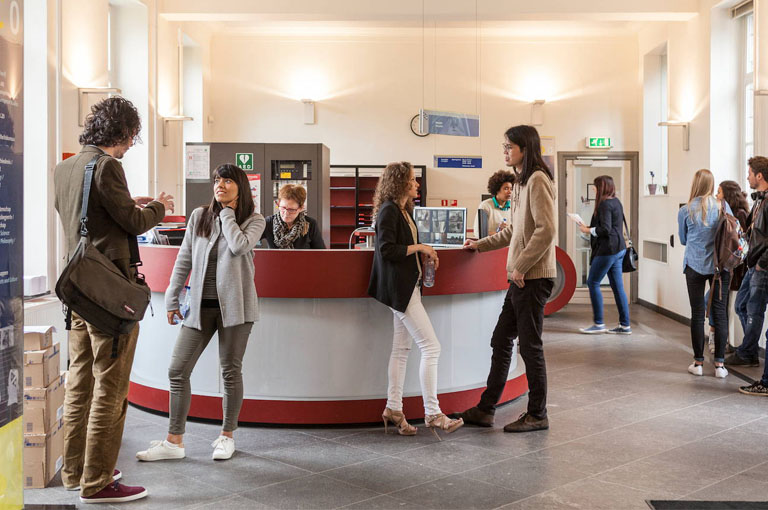“I learn something new every day”
She came to the Netherlands from Syria two years ago. Now, Maïs Sweid lives in Limburg with her husband and five-year-old son and works for the Education Office at the Faculty of Psychology and Neuroscience (FPN). Her advice to other refugees: “Don't stay at home. Go to language cafés and libraries. Meet Dutch people and learn the language as soon as possible. Getting to know people is extremely important.” This is a story about the success of work experience at UM.

Everything is new
Catharien Kerkman, head of the FPN Education Office, believes universities have a civic duty to help people in difficult situations. But there is a caveat: “Don't underestimate how difficult it is for both parties in the beginning. Candidates speak very little Dutch and everything is new for them. Arabic is read from right to left; here it's the other way around. Keyboards are also completely different. And in addition to learning the language, they also have to understand the essence and content of their work.”
Maïs Sweid, who works as an administrative support officer two days a week, agrees. “The first few days were really hard. Everyone was incredibly friendly and patient. I felt guilty that they had to spend so much time on me. But things slowly got better.”
“Work is your saviour”
Maïs came to the Netherlands with her son in 2016, her husband having arrived six months earlier. She briefly stayed at an asylum seekers' centre, but was soon offered a home. “All I wanted to do was work. In Damascus I'd worked as an administration officer for an engineering firm. But during the war, I was unemployed for three years. Once I arrived in the Netherlands, I couldn't wait to learn the language and get back to work. Staying at home is the worst thing you can do when you have terrible memories. Without the distraction of work, you spend your days worrying about the people you left behind. Work is your saviour.”
A lot depends on personal contact and a proactive attitude. Maïs and her husband went to a language café in the Heuvelland region as often as they could. That's where they met Carolien Martijn, the director of FPN. Thanks to this chance encounter, Maïs was offered a work experience position and her husband found a job as a chef in a restaurant.
“I know Maïs and her husband from the language café we set up with the help of several volunteers in our region,” says Carolien. “That's where I realised that status holders are eager to work and have a lot to offer. When you hear what some of these people have been through, their strength and resilience is amazing. They have such a strong desire to succeed and build a future for themselves. I was and still am deeply impressed, which is why I shamelessly exploit my network to arrange work experience positions and jobs whenever I can. The response from potential employers is extremely positive; everyone I ask is prepared to help.”

Alignment with work and education
Maïs’ conviction that work is of paramount importance is now being incorporated into the national refugee policy. In time, this policy will aim to help people find suitable work as quickly as possible. Alongside her work, Maïs is also taking integration classes three times a week in preparation for the NT2 exam. “I'm learning a lot more Dutch at work than at school,” she says. “In the afternoon I have lunch with the team and hear stories about children, holidays, schools, weekends... Things I want to be able to talk about, too.”
She has some advice for the people tasked with implementing the policy: “Arrange work experience as soon as possible that aligns with the refugee's former job or academic level in their home country. In addition to taking an integration course, give a hairdresser the opportunity to work in a hair salon or a pharmacist the opportunity to work in a pharmacy. This will improve their chances on the labour market and ease their frustration.”
Patience on both sides
Catharien Kerkman and her colleagues would recommend this to everyone. Having someone gain work experience enriches the entire department. Based on her experience with Maïs, Catharien has some valuable advice to offer: “Start small and slowly work your way up. Keep in mind how challenging it is for the candidate, working in a foreign-language environment with new systems and new people. It all takes practice. Give the candidate enough time and space to get the hang of things, and above all be patient. We have a colleague in our department, Eric Reijnders, who supports Maïs with infinite patience and dedication. A person like that is indispensable. Maïs is extremely loyal and hard-working. She doesn't want to be a burden and wouldn’t dare trade days with a colleague, even if it worked out better for her son.”
That's because of the difference in work culture, Maïs explains. “In Syria, the director of the organisation is surrounded by bodyguards at all times. You could never walk into the office of a higher-ranking person, let alone address them personally. It's so different here. The freedom, openness and friendliness is amazing and something I really had to get used to. This is the best experience of my life. I learn something new every day. And I'm happy here. I'm so grateful to Carolien Martijn and all of my colleagues for helping me and giving me this incredible opportunity.”
By Margot Krijnen
Also read
-
Students were issued student numbers (ID numbers) and the first student (alphabetically) was Ward Alfenaar. Today, 40 years later, we checked in with Ward to talk about his memories from those early days of studying in Maastricht.
-
As a toddler, Pieter du Plessis couldn’t stay away from the kitchen. He later entertained the idea of becoming a chef—until his dream faltered under the harsh light of reality. Now a PhD candidate at Maastricht University, he uses national dishes as a lens to examine South Africa’s past and identity...
-
Alumni success story: Y Chi's academic journey began with a Bachelor’s degree at SBE, she graduated in 2018. In this article she will tell you all the ins and outs about her career, read for more!


